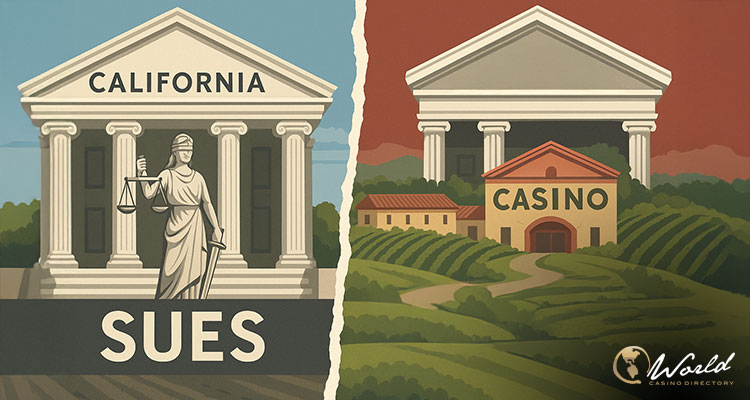The State of California and Governor Gavin Newsom have filed a federal lawsuit challenging the U.S. Department of the Interior’s recent decision to authorize the Koi Nation’s proposed casino resort in Sonoma County. At the heart of the legal dispute is a claim that federal officials unlawfully bypassed essential procedures and overstepped their authority in allowing the tribe to develop a sprawling gaming complex on newly acquired land near the town of Windsor.
The 68.6-acre parcel, known as the Shiloh Site, was approved by the Interior Department for trust acquisition in favor of the Koi Nation. The tribe intends to construct a vast entertainment complex there, featuring 2,750 slot machines, over 100 table games, and a hotel with 400 rooms, all within a 530,000-square-foot footprint. Capacity at the venue could exceed 10,000 guests.
According to the complaint filed in the U.S. District Court for the Northern District of California, Newsom and the state argue the federal government’s decision ignored key legal constraints set forth by the Indian Gaming Regulatory Act (IGRA). Specifically, they challenge the use of the “restored lands” exception, a legal provision that allows gaming on lands taken into trust after 1988 if those lands are considered part of a restoration of tribal land following federal recognition.
State Claims Misuse of Restored Lands Exception
The state contends that the Interior Department’s reliance on this exception lacked legal foundation and amounted to an “arbitrary and capricious” interpretation of the law. The lawsuit argues that the agency circumvented a standard process — the “two-part determination” — which would have required formal consultations with state and local officials, including concurrence from the governor, before a gaming site could be deemed eligible.
“By circumventing the two-part determination process, Interior has deprived the governor and the state of their rights to engage in consultation,” the complaint states, adding that the decision “forces unwanted obligations on the state to negotiate in good faith” toward a gaming compact.
The state also criticized the Interior Department’s assessment that the Koi Nation maintains a “significant historical connection” to the Shiloh area. Officials had cited trade routes, historic records, and burial grounds to support their claim, but Newsom and the state insist this does not meet the threshold for a sustained tribal presence.
“Trade is a transitory activity that necessarily involves other communities,” the complaint notes., according to Courthouse News Service. “It does not imply an enduring tribal presence comparable to the exercise of tribal sovereignty or control.”
California officials argue that the Koi Nation’s most deeply rooted ancestral and cultural connections are with lands near Clear Lake, located roughly 30 miles away from the casino site. They emphasize the contrast between the extensive documentation of Koi presence in the Clear Lake area and the relatively limited evidence tying them to the Shiloh Site.
Community and Tribal Opposition Mounts
The lawsuit comes amid broader local and tribal resistance to the casino plan. The Federated Indians of Graton Rancheria had already initiated a legal challenge, asserting the project threatened their own tribal lands and sovereignty. Three other tribes from Sonoma County — Dry Creek Rancheria, Lytton Rancheria, and Cloverdale Rancheria — followed with their own complaint shortly after.
Greg Sarris, Chair of the Graton Rancheria, welcomed California’s move. “We strongly support California Governor Gavin Newsom’s suit challenging the Interior Department’s rushed, illegal decision,” he said. He characterized the federal approval as a politically motivated action taken in the waning days of President Biden’s administration, without adequate regard for environmental law or tribal consultation.
“Unelected Washington bureaucrats steamrolled this project to achieve a predetermined outcome,” Sarris said.
Local grassroots organizations have also joined the chorus of opposition. Nina Coté of Our Community Matters, a group opposing the development, argued in a court declaration that the project would negatively impact the quiet residential neighborhoods surrounding the Shiloh Site.
“The Project will be devastating to the character, public safety, environmental quality and fire evacuation risks of our quiet residential community,” Coté stated, noting that the area includes homes, schools, churches, and vineyards.
One crucial point raised in opposition is that county zoning ordinances would typically prohibit a casino at that location. However, once the land is placed into federal trust, local land-use regulations no longer apply — a loophole that has galvanized critics.
A Shift in Federal Oversight?
A political shift at the federal level may influence the outcome of the project. Under new leadership in the U.S. Department of the Interior — now led by Secretary Doug Burgum after President Trump’s second inauguration — there are signs the administration may reconsider previous casino approvals. In March, the department paused a separate gaming decision for another tribe, citing the need for further review.
Burgum is among the named defendants in California’s lawsuit, along with other senior officials from the Bureau of Indian Affairs and the Department of Interior. The Koi Nation declined to comment on the legal developments.
Governor Newsom and Attorney General Rob Bonta argue that the Interior Department’s decision disregards voter expectations expressed in Proposition 1A, which allowed for regulated tribal gaming in California under tightly controlled geographic constraints.
The plaintiffs are asking the court to invalidate the Interior Department’s approval and declare the site ineligible for gaming under the restored lands exception.
As opposition to the Koi Nation’s proposed casino intensifies across tribal, state, and community lines, the outcome of this case may set a lasting precedent for how federal gaming laws are interpreted and how tribal lands are designated for development in California and beyond.


